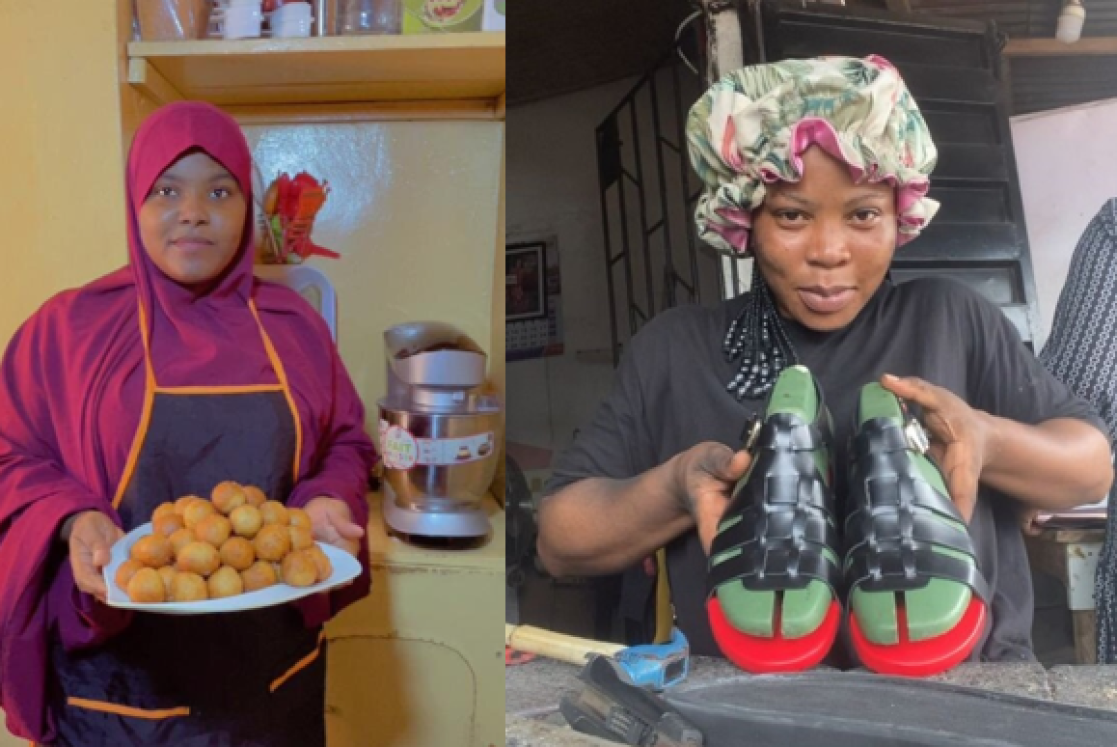Digital is her power: a story from Africa

Ms Allwell-Brown Ibitoru is the proud owner of Angie’s Ice Cream and Pastries in Abuja, Nigeria. After following the EU-funded Business Optimisation Workshop for Women her mobile phone-made videos posted on Instagram the number of costumers has shot up. A new generation of business-women is getting ready for a digital society and economy in Africa.
Aisha runs her food shop Aeeshak Tasty Bites and More in Kano (Nigeria). Applying the social media marketing techniques learned at the same workshop, her business experienced a 30% increase in customer orders within a month. In the bustling metropolis of Lagos, the workshop helped leather-crafts entrepreneur Eruanga Gloria Olokhirere, owner of Slides by Ego, boost her online sales. She now manages sponsored ads, maintains a consistent posting schedule, and designs professional-looking flyers using tools like Canva.

European Union, 2024
These are just a few stories of a new generation of African business-women who have discovered the transformative power of digital skills and strategies to grow in today’s competitive marketplace.
The Business Optimisation Workshop for Women is a capacity-building programme deployed by the Digital Transformation Center Nigeria (DTC), under the EU-Nigeria Digital Economy Package. The DTC has so far trained 50 start-ups and over 6.000 entrepreneurs, with women and youth as a priority.
“Through the initiatives of the Digital Transformation Center Nigeria, we have empowered women-led SMEs with essential digital skills, enabling them to expand their businesses and reach new customers. These women are not just growing their enterprises; they are driving economic inclusion and inspiring a digital transformation across their communities. This is the power of equipping people with the tools to innovate and thrive in a digital economy”.
 Dr. Thuweba Diwani, Project Manager at the DTC
Dr. Thuweba Diwani, Project Manager at the DTC
In Borno and Yobe States, North-East Nigeria, an EU funded project is promoting digital skills for women, hard-to-reach youth, and persons with disabilities. Y. Ishaku is a student and rides a “keke” (tricycle) to make his living. “After joining the social media marketing training, I got the idea of transforming my “keke” business to an Uber-like approach by creating a flyer and sharing it on my digital social accounts for delivery services”. He can now better combine his studies with his business.
"Team Europe is proud to support Nigeria’s digital transformation in close partnership with the Federal Government of Nigeria, driving initiatives that foster connectivity, innovation, and inclusion. Through the €820 million Digital Economy Package under the EU Global Gateway Strategy, we are supporting critical infrastructure development, like the national fibre-optic network, building up a digital economy eco-system creating employment opportunities and empowering CSOs. Milestones like the adoption of the Data Protection Bill demonstrate our shared commitment to spurring economic growth and digital trade, boosting skills and jobs, enhancing governance, and safeguarding citizens’ rights. Together, we are shaping a secure, inclusive, and prosperous digital future, making Nigeria a leader in Africa’s digital economy."
Amb. Gautier Mignot, Ambassador of the EU to Nigeria

European Union
Through the Digital Economy Package, Team Europe - including the European Investment Bank (EIB) - is supporting the rollout of the 90,000 KM of fibre-optic cable infrastructure and data centres across Nigeria. These initiatives aim to improve access to high-speed connectivity and triple national data capacity. In addition, the DEP is assisting the digitalisation of public services (e-governance); promoting the creation and scaling up of tech start-ups to boost innovative solutions and providing training to equip Nigerians with the skills needed to thrive in the digital economy.
To ensure that the digital transformation works in the interest of citizens and risks are minimized, the EU and Nigeria also worked together on the development of legal frameworks to ensure the highest standards of privacy, safety and cybersecurity, while promoting an open internet and digital market that upholds citizens’ rights. Nigeria’s adoption, with EU support, of the Data Protection Bill in 2023 and the setup of the Data Protection Commission of Nigeria are particular successes that enable a stronger EU-Nigeria cooperation in many other areas.
Nigeria is a frontrunner in Africa’s digital transformation. Its tech start-up environment is unparalleled on the continent, with five out of seven African unicorns and start-ups attracting $1billion investments per year. The ICT sector contributes above 18% to Nigeria’s GDP. This is why the EU’s first Digital Economy Package targeted the fertile ground in Nigeria’s digital ecosystem. But it did not stop there: beyond Nigeria, the EU has also deployed Digital Economy Packages with Democratic Republic of Congo and Kenya.
Connecting Africa

European Union, 2024
The African continent, with its rapidly growing young population, vast natural resources, and increasing economic influence is set to earn the most benefits from digital technologies. However, challenges in terms of broad and secure connectivity infrastructure, population digital literacy, affordability and policy gaps threaten the progress in this area.
 The EU and its Member States are ready to work together with African partners to overcome those challenges with expertise and investments. To that aim, the European Commission has signed a partnership with the Smart Africa platform that brings together key stakeholders from public and private sectors to identify joint solutions aimed at unlocking the continent's digital potential, boosting inclusive growth, and fostering human-centric transformation.
The EU and its Member States are ready to work together with African partners to overcome those challenges with expertise and investments. To that aim, the European Commission has signed a partnership with the Smart Africa platform that brings together key stakeholders from public and private sectors to identify joint solutions aimed at unlocking the continent's digital potential, boosting inclusive growth, and fostering human-centric transformation.
This partnership matches the goal of the EU and the Africa Union to join forces for transforming Africa into a single digital market. One day not far away, customers from all corners of Africa and Europe will shop Ms Ego’s leather products on-line.




